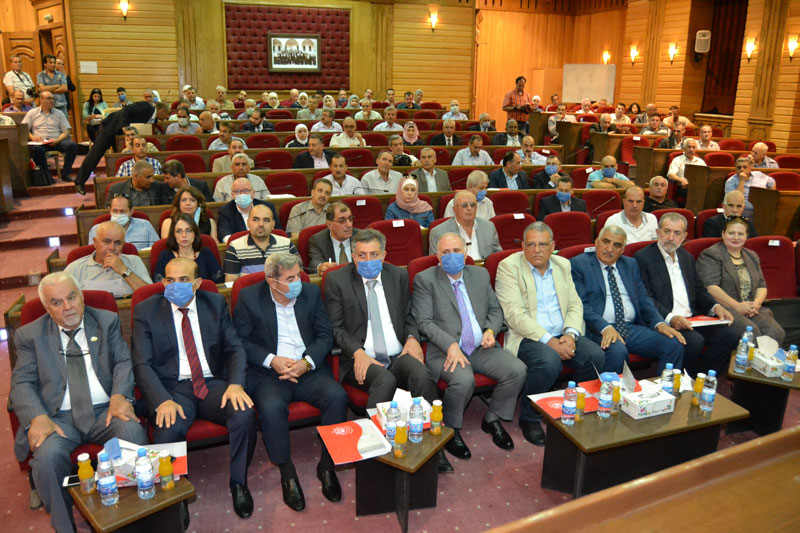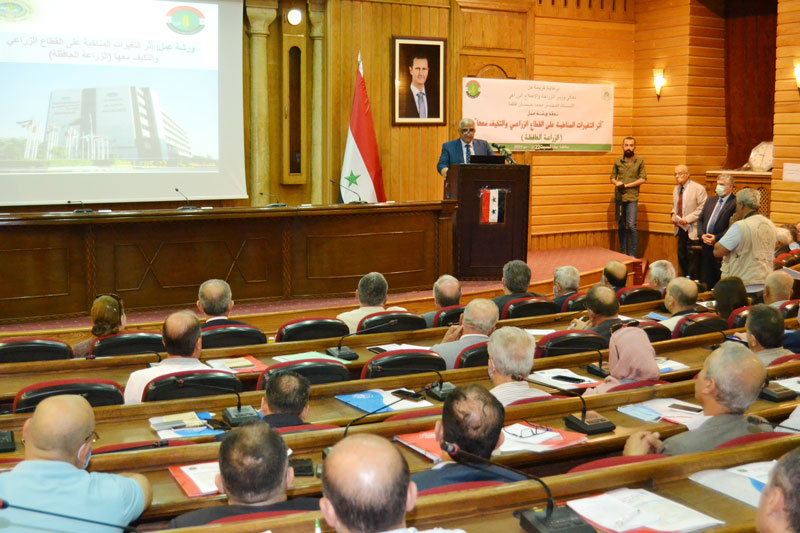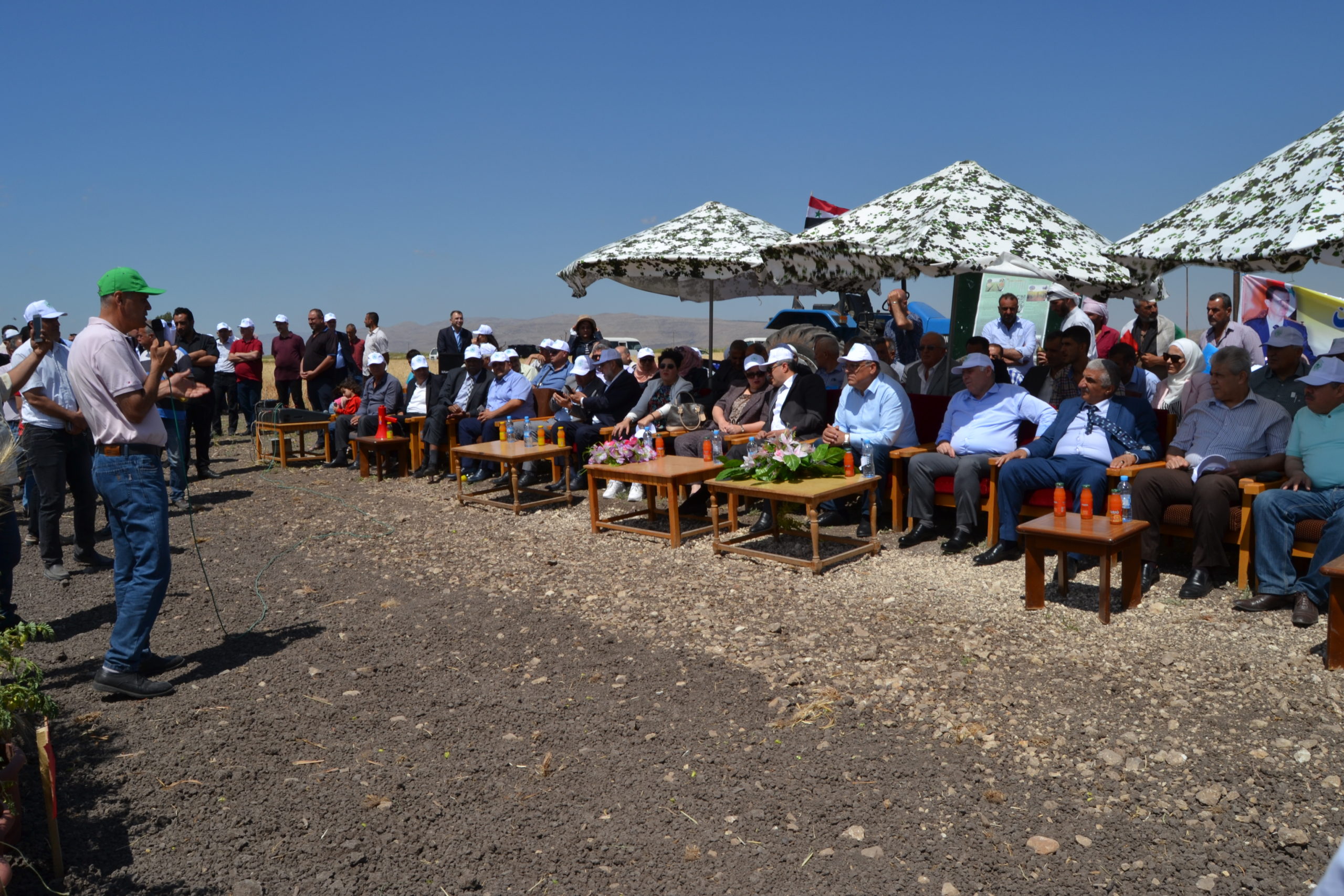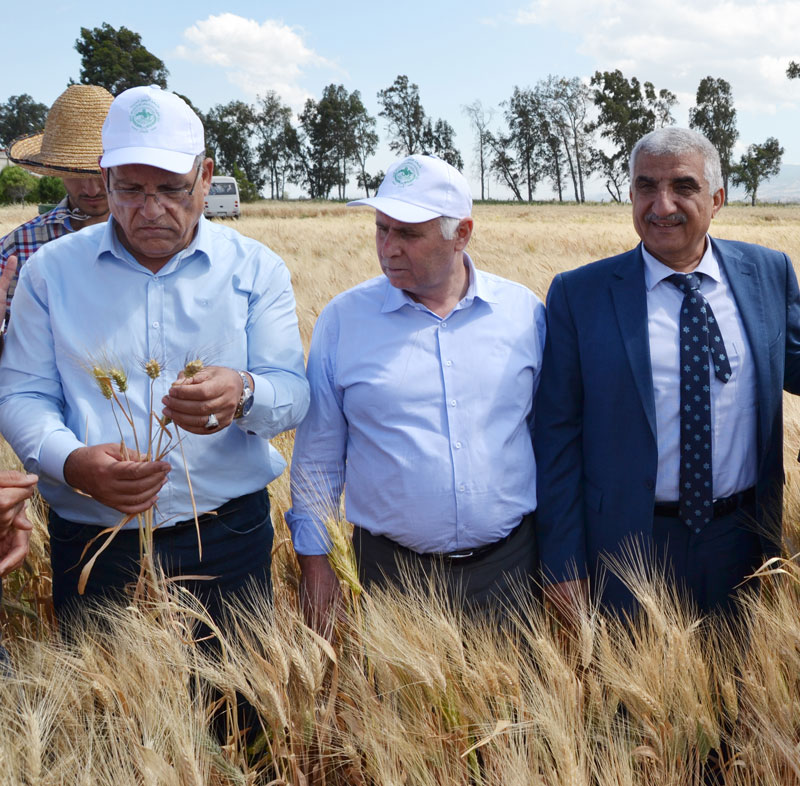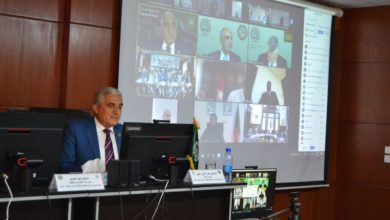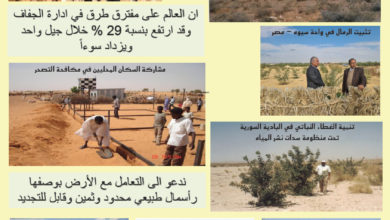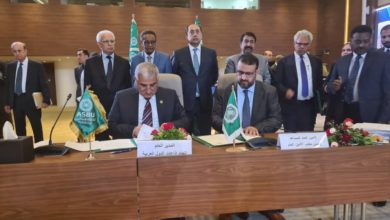The Ministry of Agriculture and ACSAD / a workshop on Climate Change and Conservation Agriculture
The Ministry of Agriculture and Agrarian Reform in the Syrian Arab Republic, in cooperation with the Arab Center for the Studies of Arid Zones and Dryland ACSAD, held a workshop on the Climate Change Impact on the agricultural sector and the adaptation with it. Today, Saturday in Hamah governorate, in the presence of his Excellency, the Minister of Agriculture and Agrarian Reform, Eng. Muhammad Hassan Qatana, the Water Resources Minister, Dr. Tammam Raad, his Excellency, the Director-General of the Arab Center, Dr. Nasr Edin Obaid, the two Governors of Hamah and Idleb, Secretary of the Ba’ath Party branch in Hamah, and representatives of the Ministry Local Administration and Environment, Agriculture Faculties at Al- Ba’ath University and Hamah’s, the Syndicate of Agricultural Engineers, the Peasants Union, the Remote Sensing Authority, and representatives of the regional and international organizations working in Syria, and Federation of Agriculture Chambers.
His Excellency, the Agriculture Minister, Eng. Hassan Qatana gave a comprehensive presentation on the impact of climate change on agricultural production and the solutions to adapt to these changes to mitigate their effect on production and agriculture and invest all the resources to achieve food and production stability.
The Agriculture Minister confirmed that that workshop aimed to highlight climate change, drought, and the rising temperatures that occurred this year; the great impact on agricultural production, especially the cultivated areas with strategic crops of wheat and barley, particularly the rain-fed lands. In addition to the fruit trees and the forest areas that depend mainly on rain for their cultivation, growth, and life.
The Minister explained that this year the precipitation of rainfall rates was very low on all lands and Syrian governorates compared to the previous years, where the precipitations decreased in previous years, and drought occurred, but in few agricultural stability areas or some governorates. Whereas, this year, the drought was inclusive of all Syrian lands.
The Minister pointed out that the workshop today was attended by all specialized technicians from organizations, universities, researchers, the Agricultural Research Commission, unions, associations, and farmers for direct dialogue about what could be done to overcome the impact of climate changes on the agricultural sector production, which affected not only in Syria but in the Arab region as a whole. So that requires regional and local cooperation to implement specific programs to overcome their impact.
The Minister clarified that today one of the experiments implemented by the Agricultural Research Commission had been presented, in cooperation with ACSAD, to use conservation agriculture as one of the addressing means of those climate change. He noted that the Agriculture Minister had more than 20 factors to intervene to reduce the impact of these changes. The Minister also Pointed out that the problem is not just the loss of production and that farmers are affected; because when the farmers lost their production, they also lose their food security and the possibility of cultivation in the next year because they do not have the financial resources to secure supplies; therefore, it is necessary to find agriculture financing institutions and change the followed financing methods currently used in the cooperative agricultural bank to enable farmers to cultivate next year. He added, “We, as technicians, have to cooperate with organizations, research centers, and universities to find the programs and projects specialized in addressing climate change impact, modifying agricultural courses, and studying the agricultural stability regions. Modifying cultivation methods, fertilizing treatment, and integrated management to combat pests, managing the appropriate varieties suitable for cultivation that addresses drought, and putting in place an integrated national project to apply modern irrigation techniques broadly on the span of all Syrian lands.
In his turn, his Excellency, Dr. Nasr Edin Obaid, confirmed in a speech that this workshop aimed to unify and coordinate the national efforts to deal with climate change and adapt to it, overcome its effects, increasing the flexibility for integrated addressing to it; calling for all ministries, national institutions, and relevant organizations to participate. Furthermore, concerted efforts in addressing the adverse effects imposed by climate change and drought waves experienced by the country; discussing to find the suitable solutions to adapt to it, and choosing Hamah governorate to hold this workshop as representing the natural and climatical conditions of the central area in the Syrian Arab Republic and the widest cradle of cultivation and production of the main crops.
He explained that our Arab region suffered from rainfall scarcity and lack in its water resources, where nineteen Arab countries are below the water poverty line, of which six Arab countries have an annual per capita share of less than 200 cubic meters. It is expected that this water deficit will exacerbate in the future because of the climate change effects. Therefore, the Arab strategy for water security in the Arab region emphasized addressing the futuristic challenges and requirements of sustainable development (2010 – 2030) that ACSAD worked on developing and apply its implemental plan and worked on the importance of climate change. He also said, “Over the past ten years, we had attached great importance to climate change and adapting to their effects. We had carried out numerous projects and studies in that field, the most important of which was the project to study climate change in the Arab region.
Several experts and researchers in the Arab Center ACSAD highlighted on climate change that Syria affected by, the good agricultural practices conducted by the agriculture Ministry in Syria to adapt to these changes, which are conservation agriculture, producing the varieties resistant to drought, bio-fertilizers, soil conditioners ( hydrogel – zeolite – Organic materials ), green fertilization, organic agriculture, non-conventional water, rainwater harvesting, regularized use of water, modern irrigation, earlier warning of drought, and climate-smart agriculture.
They also highlighted the joint programs between ACSAD and the Agricultural Research Commission in the fields of adaptation to climate changes, such as non-conventional water projects, the sustainable development of natural resources project, the project of safe use of sludge, conservation agriculture project, and bio-char.
The workshop events included presentations on luminous displays on climate change impact on the agricultural sector, especially the field crops, and their adaptation through good agricultural practices, application of the conservation agriculture system, and a field survey in Al- Ghab region to visit these conservation agriculture fields and familiarize at their positive results.
The importance and the necessity of this workshop come after the agriculture sector exposure in Syria this year to exceptional circumstances resulting from climate change affected by the countries, which led to a decrease in land productivity and decline in yielding because of the heat stress, the bad distribution of precipitation and drought. In addition to the decrease of rangelands’ revenue resulted from pastoral plant cover deterioration, the long-term effects of land degradation and decreasing their cultivable areas, the accelerating of soil erosion, the decelerating of decomposition of organic material, and the water resources scarcity.
The Ministry of Agriculture and Agrarian Reform and the Arab Center ACSAD organized this workshop to highlight the importance of cooperation and consultation in increasing the flexibility towards climate change and mitigating its negative effects on natural resources, ecosystems to reduce their adverse effects on the agricultural sector.
The Arab Center ACSAD has already begun working on adaptation to climate change through several procedures such as the application of conservation agriculture as it helps to preserve and prevent soil from degradation and increase soil moisture, provide inputs to production, help with water harvesting and redistribution, improvement of crop productivity, increase water use efficiency and reduce agricultural production costs.
ACSAD also implemented conservation agriculture over an area (30000 hectares) distributed in the governorates of Al-Hasakah, Daraa, Hama, Aleppo, and Raqqa, resulting in increased production and reduced fuel consumption, seeds quantity, and the provision of irrigation water.
The workshop is a platform for various and successive qualitative activities in preparation for climate change and a clear road map to overcome and adapt to the adverse effects of climate change.
The workshop’s activities included a field visit to the Al-Ghab region. The conservation agriculture fields of wheat and chickpeas, which ACSAD had implemented, were reviewed in cooperation with the Ministry of Agriculture and Agrarian Reform to see the positive results achieved in implementing this agricultural system; its influential role in adapting to climate change; in addition to other environmental and economic benefits, and to work on putting in place a spatial map of agricultural land showing the best areas for the expansion of this important agricultural system
It should be noted that peasant associations, farmers, and local community organizations in the AL-Ghab region participated in the field visit to generalize the benefit and promote awareness of the negative effects of climate change and ready to address them in case the climatical conditions passed by Syria repeated.
